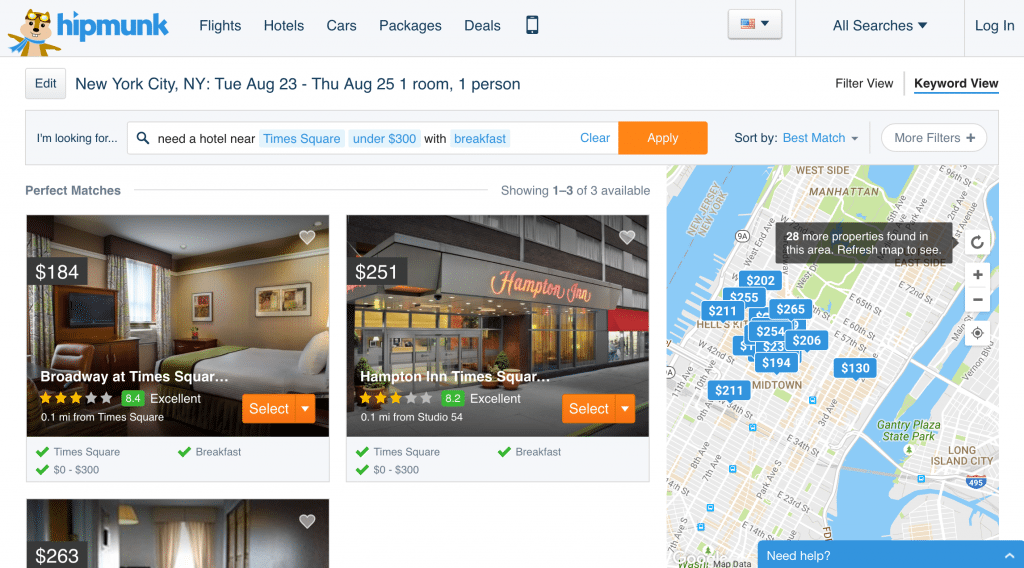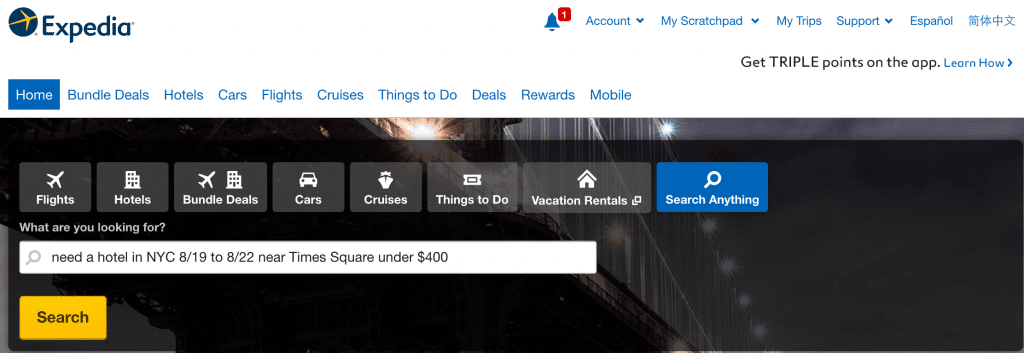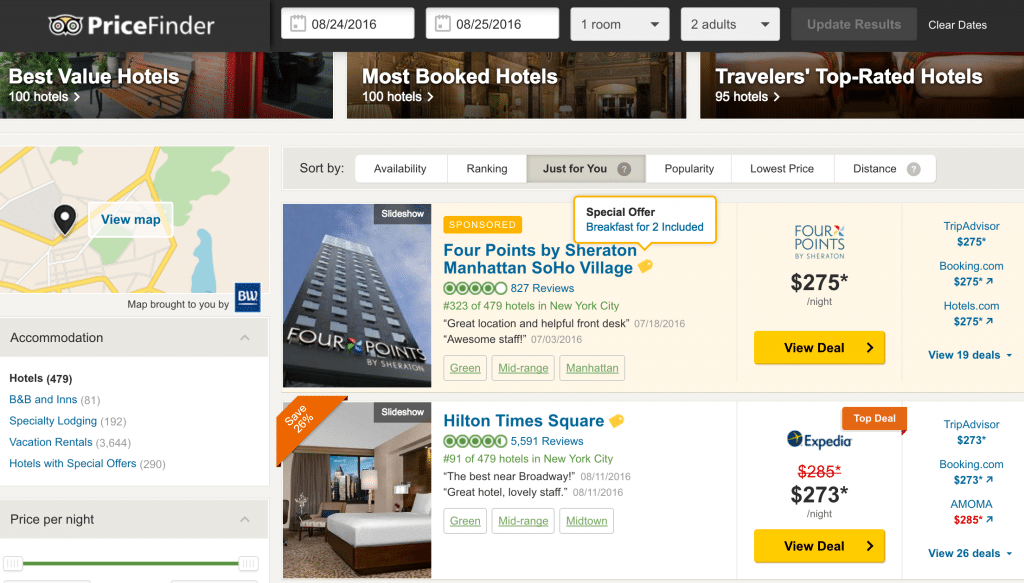In Search for Perfect Hotel Results, Hipmunk is Latest to Give it a Try

Skift Take
Does the hotel search result you view on an online travel site a perfect match, just in the ballpark or even irrelevant?
Six-year-old metasearch site Hipmunk quietly began offering desktop-site visitors the ability to enter natural language queries such as, "I want a cheap hotel on the Upper West Side" in a bid to make searching easier and to provide more relevant results.
Travelers type natural language keywords into a search field and receive corresponding results with real-time availability and rates. The update isn't immediately obvious and requires some guesswork to locate as there's no banner or text indicating users can perform such a search.
But various keyword searches we tried yielded relevant results. Hipmunk's latest update follows moves by other search and booking sites to test natural language search with travelers.
Travelers must still choose a city, dates and number of travelers and rooms on Hipmunk's home page. They can then navigate to the search results' page and select "keyword view" on the right-hand side of the screen, pictured below.
They can then enter the type of hotel they are looking for in natural language in the search box.
Hipmunk categorizes and displays the results as perfect, partial or low matches. In various queries we made, Hipmunk produced from three to 20 "perfect matches" (those matching all search criteria entered).
Hipmunk co-founder and CEO and Adam Goldstein told Skift the update hinges on making the hotel search process simpler and preventing travelers from having multiple tabs open or checking multiple sites at once. Sometimes, though, there can be more than 200 partial results, or those that matched some but not all keywords.
How Many Are Too Many Results?
The site's landing page now says "The best hotels...for cheap" compared to its previous message, "Don't let planning travel drive you nuts."
But if Hipmunk's point is to make hotel searches faster and easier, does it makes sense to show dozens or even hundreds of results?
It's not about showing only a few of the best hotel results, said Goldstein, as the company doesn't want travelers to feel they're being deprived of all options, "We don't think in terms of number of results. We think in terms of what's best for the consumer. We limit our results more on the flights side because some flights are just bad options for some travelers."
"With hotels we don't want to hide results from people unless they're really terrible. We're not in the business of hiding anything from you. We'll put the worst options based on what you searched for at the bottom of the page."
Goldstein said the site's price slider, which travelers can use to set a range for hotel rates and only see hotels falling on that spectrum, led it to introduce different tiers of matches. "Suppose you search for a hotel for $250 a night in New York City by dragging the slider. But the thing is that you might not see any hotels in there that you may love."
"We noticed that people were dragging the slider to $275 or $300 a night so that they could get closer to a perfect match. We're still a big believer that we have to give travelers the maximum amount of results."
Challenges With Natural Language
Goldstein talked to Skift last year about "the race to the middle" where online travel agencies are adopting more metasearch-like features and metasearch sites are incorporating online travel agency features.
But that didn't weigh on Hipmunk's latest update, "Looking at competitors gave us ideas for what not to do rather than what we should do," said Goldstein. "We're not differentiating for the sake of it but differentiating because we think that our customers find this useful."
Hipmunk has been analyzing data on travelers' natural language requests for more than a year on its Hello Hipmunk virtual travel agent product. Goldstein admits the site "got it wrong" with its first go-around with natural language on Hello Hipmunk because it anticipated travelers asking completely different questions than they actually put forward. "We thought people would use it like a human travel agent but our biggest surprise was that those turned out to be a small amount of their questions."
"They were asking more general questions like 'when is the best time in October to visit Seattle for a weekend?' We were trying to figure out how to answer a question like that and it was a lot of effort for our team to answer questions like that. And also just to figure out what the traveler was actually asking with questions like that."
While Hipmunk launched artificial intelligence bots in June for the Facebook Messenger and Slack mobile apps it clearly isn't abandoning the desktop experience. Other metasearch and booking site players seem more focused on experimenting with natural language on mobile messaging platforms with bots rather than on desktop or mobile sites. Expedia, Skyscanner and Kayak all have bots on Facebook Messenger and Kayak also has a Slack bot.
Expedia.com does offer natural language search on desktop, though, which is more visible than Hipmunk's. Expedia's Search Anything icon on its landing page, pictured below, lets travelers perform a hotel search as they would on Google, for example, and it isn't buried and doesn't require an extra step to get to. The query below gave only one result and wasn't displayed as helpfully as on Hipmunk, but it still worked.
Hipmunk's hotel results still feel more user-friendly than those of Kayak and TripAdvisor. With TripAdvisor, which is still figuring out its Instant Bookings product, the first result is sponsored and comparing different results isn't as frictionless as the experience on Hipmunk.
Goldstein said he's not sure how travelers will use its new hotel-search feature. "We might not be able to answer everything right off the bat. Maybe we will. We're really taking what we've learned from Hello Hipmunk where we started off with email and calendar integration and we would automatically send you emails when we saw you had meetings or events that you would have to travel for."
Taking this to mobile isn't an option until Hipmunk understands how consumers respond to the technology, according to Goldstein.
Meanwhile, Google's solution to providing relevant results, whether it's for flights or hotels, is to provide instant answers instead of a list of links. But Google shows a bias in strongly favoring results from Google-owned business units.
What's clear is that online travel agencies and search engines still have a tremendously long way to go in producing results that match what consumers want but they are doing plenty of testing and learning about how to get closer to their goals.







